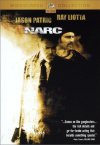BUY THE DVD:
|


|
|
|
SYNOPSIS:
| |
when the trail goes cold on a murder investigation of a policeman an undercover narcotics officer is lured back to the force to help solve the case.
|
|
|
MOVIE FACT:
| |
had its premiere at the 2002 sundance film festival.
|
|
|
RATING:
|


two out of four possible stars
|
|
|
|
If you are at all prone to headaches, viewing the first five minutes of this film will be rather difficult. The shaking and jerking of the camera in the opening sequence should be considered nothing short of legendary. But though the photography might, at times, cause those in the audience with weaker constitutions to squint their eyes in pain, the drama that comes from the two lead performances of Narc will make any viewer slack jawed. Through all this film’s faults, Ray Liotta (playing the wild cop with a vendetta to chase down) and Jason Patric (playing his new partner with a violent past to escape) present a couple of characters on screen with an expert dose of reality that is easily recognizable as great talent in acting.
Their characters are barely likeable, their story is rather depressing when all is said and shot, and the lives of these two cops are covered in a foot deep cloud of grime, dirt, and violence. But during the scenes of interaction between these two actors, this film is a punch in the face to viewers which will doubtlessly stay lodged somewhere in their collective brain long after the credits roll. Despite the fact that understanding the pain and torture of these two cops’ daily lives is a job for viewers in and of itself, it is a job well worth taking for the benefit of seeing such effective drama on the screen.
But one has to work diligently to appreciate the film as a whole, as elements such as music, pacing, cinematography, and character sometimes come up short. In fact, it would be easy to dismiss this film as just another cop saga if not for those lead performances, and showing this film to an audience with a widely varying demographic would probably result in quite a few angry viewers. This film will not please many people except for those who can see past its faults to the value of the names listed above the title on the movie poster. With a dearth of supporting characters with real depth, it is all one can do to focus on the two main characters for emotional satisfaction.
Krista Bridges, who plays Patric’s wife “Audrey” has quite the standard wife of a cop roll where she moans day after day that she cannot take her husband’s devotion to his job any longer. Although it would be an evasion of real life have her character understand and simply accept her husband’s job and just “live with it,” her response to the danger her husband places himself in has no variety to it. She has the same opinion and the same dialogue throughout the film and never becomes anything but a static character. Although the miscreants and deviants Patric and Liotta’s characters must deal with charge the story in their own well shod moments, there is no character that really stands out enough to make the film any sort of ensemble piece.
The film is somewhat lacking in the treatment of its supporting cast and when Liotta and Patric aren’t arguing, something their characters are easily prone to do, the film proceeds haltingly. And truthfully, the scenes between them don’t always move the story forward fast enough either. The story moves forward in fits and starts of emotional climaxes and isn’t always able to keep the plot contingent on character. Though a detective story, by its very nature is a plot-driven experience, the screenwriter failed to really meld the sequence of events with the emotional progression of the characters. It’s as if, in some scenes, the cops move on to their next clue, and then halt the action to exchange character information.
Something else which keeps the film from being a cohesive whole is the soundtrack. Almost sounding like a dreamy, ethereal experience on some tracks, the orchestral score is very much at odds with the emotion of the characters on screen. The score all but calls attention to itself at times, thereby separating itself completely from the film and becoming a element on its own, rather than just a part of the story. And the same can be said for the cinematography, which, while it is visually interesting to say the least, also drives attention away from the characters with its unique look.
While the distinctive look and sound of the film are both well-presented elements, they still take the stage too easily from the film, making it rather difficult to suspend one’s disbelief and simply watch the film. The unequal elements of this film war with one another, each trying to make an individual statement rather than form a complete picture. These auxiliary elements might only be so obvious though because of the stumbles the screenwriter makes with character and story. It is hard to criticize the two lead actors, as their performances are both the most absorbing of their respective careers, but it is easy to blame the director, screenwriter, cinematographer, and composer for failing to make the story of these two characters the most important aspect of the film.
Review by Kelsey Wyatt.
| |
|